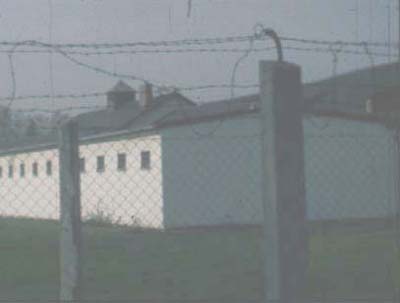double trouble

Dachau (picture taken 1983)

Guantanamo (via BBC)
Sir Ian McKellen recently gave an absolutely endearing interview on the BBC’s HardTalk, in which, in addition to discussing his role as the Lord of the Ring’s Gandalf, he spoke extensively about his activism for gay rights. Says McKellen:
“The world is a much more interesting place than fundamentalists allow it to be (and) The President of the United States is inexperienced in this way. It hurts me to imagine that the constitution of this great country thinks it’s unsuitable for me to have a relationship that is on par with that of Mr. and Mrs. Bush.”
Now there’s a wizard I can believe in!
One the most intriguing parts of the LOR trilogy was Gandalf’s transformation from Gandalf the Grey into Gandalf the White, after having plummeted to a flaming abyss in a mortal struggle with the Balrog, in the Mines of Moria. According to Wikipedia’s entry on Gandalf: the change of color is significant, for he has come to replace the corrupted Saruman as the chief of the Wizards. In a sense he has become Saruman, or rather what Saruman should have been.
In his transformation to whiteness and thereby to a higher level of wizardry , Gandalf exhibits a kind of protean quality; a fluidity of personality which quite often exists even in mere mortals. Proteanism is about self-reinvention as an adaptation to changing conditions. The psychohistorian Robert Jay Lifton explores this phenomenon in his 1993 book, The Protean Self- Human Resilience in an Age of Fragmentation The book is a relatively uplifting work which presents a number of case studies of people who have completely reinvented themselves as a response to changing parameters in their lives. But there is a dark side to this and Lifton is perhaps one of the world’s foremost authorities on the nature of intrinsic evil. I first ran into Lifton’s work several years ago when I got a job skimming through his archive of research notes and correspondences at the New York Public Library. I was developing background for a Japanese television documentary. Because of my somewhat rudimentary command of German, I was asked to go through the transcripts of the interviews that Lifton did for his seminal book Nazi Doctors. The book explores the peculiar phenomenon of “doubling” in which seemingly unremarkable, middle-class German professionals were able to perform appalling medical experiments on living concentration camp inmates, as a matter of routine and then at the end of the day, go home to their wives and children – as if nothing unusual had ever happened. Lifton theorizes that we carry within us the ability to *compartmentalize* and to literally develop another personality that becomes comfortable with performing activities previously abhorrent to our quotidian sense of morality. The frightening thing is that this means that genocide is carried out, not by a few lone psychopaths, but by many, compliant outwardly normal individuals, eager to gain approval from power structures that have become demented. It really is about unquestioningly buying into the *new normal.*
The Globe and Mail recently published an insightful review on Lifton’s new book Superpower Syndrome: America’s Apocalyptic Confrontation with the World – a psychohistorical analysis of the United States’ foreign policy since 9/11 in which Lifton examines the Bush administration’s reactionary and apocalypticism and fundamentalist sense of righteousness and mission.
The warning from Lifton is that hegemony can become normalized pretty quickly, especially when a culture perceives itself to be under some kind of threat. We now live in an age where (at least in the US) the detention of hundreds of “illegal enemy combatants” without charges, lawyers or any public scrutiny has become routine and that even *publishing* works by writers from certain countries such as Iran will incur “grave legal consequences “ if, (according to the New York Times) illustrations are added, grammer and syntax corrected or paragraphs are reordered. The Times quotes Nahid Mozaffari, a scholar and editor specializing in literature from Iran, who calls the implications staggering. “A story, a poem, an article on history, archaeology, linguistics, engineering, physics, mathematics, or any other area of knowledge cannot be translated, and even if submitted in English, cannot be edited in the U.S.,” she said. When hearing about the rapidly deteriorating human rights climate under the Bush administration, I am haunted by recollections of my own parents’ accounts of experiencing the rise of the Nazis, as children growing up in Germany. It began with patriotic fervour and the trains running on time and then suddenly- the neighbours began to disappear. . . The road to totalitarianism is paved in increments.
And while I’m on the topic of information control, I was flipping through a recent Vanity Fair (which doesn’t appear to be archived on-line) and between pictures of Gwyneth Paltrow and a Versace ad, I noticed a beguiling (if somewhat incongruously placed) photograph by Subhankar Banarjee. It featured a loon nesting on the shore of a pristine tundra lake, in the middle of the vast landscape of Alaska’s Arctic National Wildlife Refuge. It turns out that officials in the Smithsonian Institution, under pressure from Congress, had a show of Banargee’s photos moved from a prominant location to a marginal basement gallery, after the controversial Boxer-Chafee amendment was passed. They also ordered the removal of the descriptive passages from the photographs and demanded that Banerjee’s publisher take out references to the Smithsonian from a book containing the pictures. It seems that the photographs depicting the fragile beauty of the arctic Alaskan ecosystems were deemed too political to serve up uncensored, to an American public being primed to accept the incursion of oil rigs into one of the last pristine wildernesses on the continent.
Laura made a rather elegiac post a little while ago about ‘lighting the beacons‘, inspired by the magnificent scene in The Return of the King of a chain of beacons being lit, one by one, on snow-capped mountain peaks, in order to summon the Rohirrim to come to the aid of Gondor. We watched this film over New Years, together with Ruth and we all agreed that lighting the beacons was a powerful trope for how we saw ourselves as activists, writers and bloggers. Despite the gathering clouds of hegemony, we can take heart from the efforts of such disparate individuals as Sir Ian McKellen, Robert Jay Lifton and Subhankar Banarjee, to shine light on the darkness that threatens to engulf us.
Of course the way net culture facilitates the dissemination of ideas and the organization of dissent is one of the very brightest beacons of hope against increasingly repressive. political and corporate institutions. There has been a lot of hype lately about social networking software such as Orkut and Friendster which (although the marketing seems to focus too much on the facilitation of *dating*) have the potential to be used as powerful tools for community building. I was particularly pleased to see a link to a discussion on wikis as social networking software, via the many2many weblog. This posting (on Darwin) was the best description I’ve seen of the anarchic, *swarminess* of wikis, which always feel like they might at any time implode but are ultimately utterly stable. My plone site is set up for wikis (actually zwikis) which anyone who becomes a member can add and use. ( I am in the middle of a messy migration to Plone 2.0 though, so please be patient with any glitches) The structured text (STX) syntax that zwiki utilizes is a powerful yet simple shorthand for linking to other posts and is painless to learn. *And* you can edit other people’s stuff !



